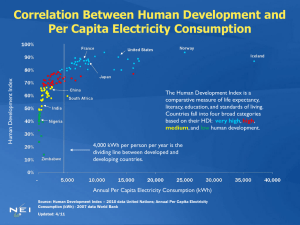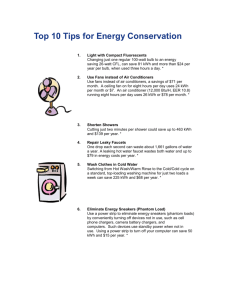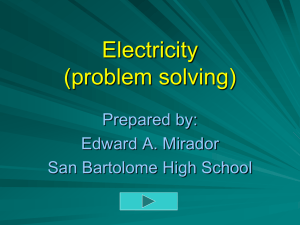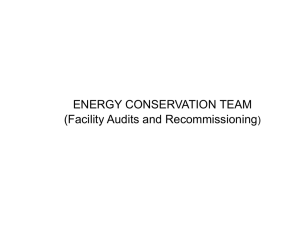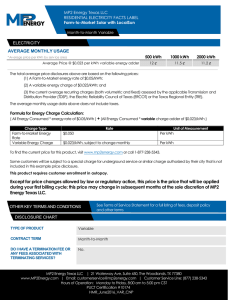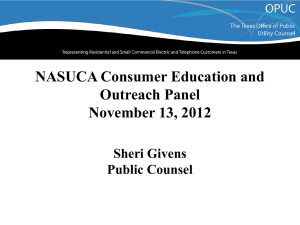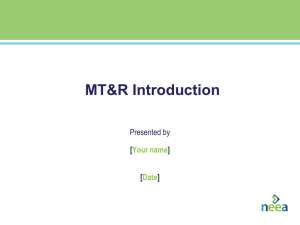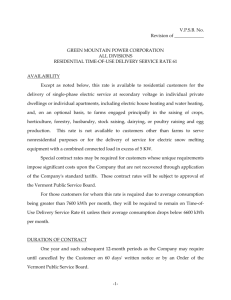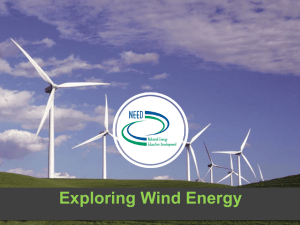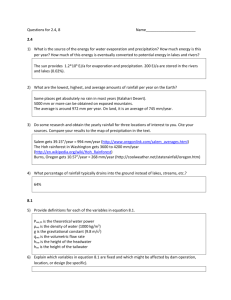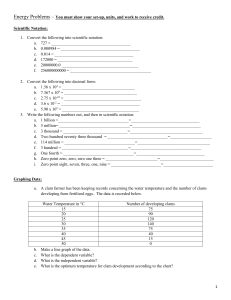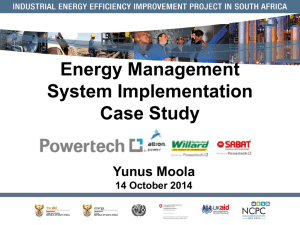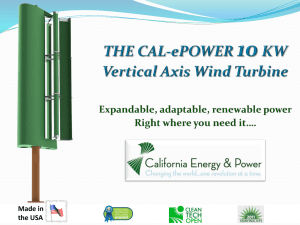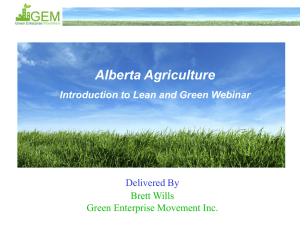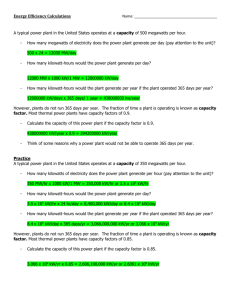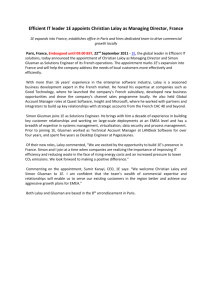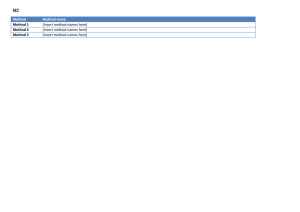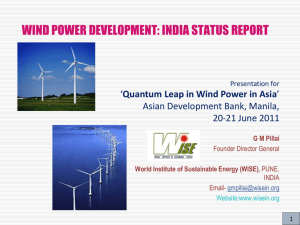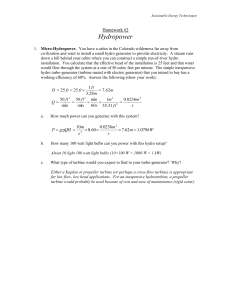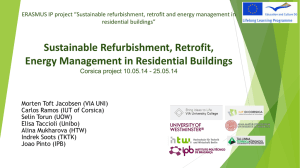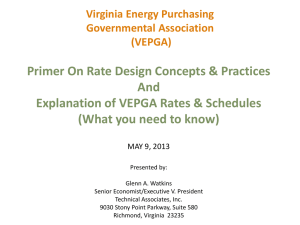Small Wind: Home and Ranch Applications
advertisement
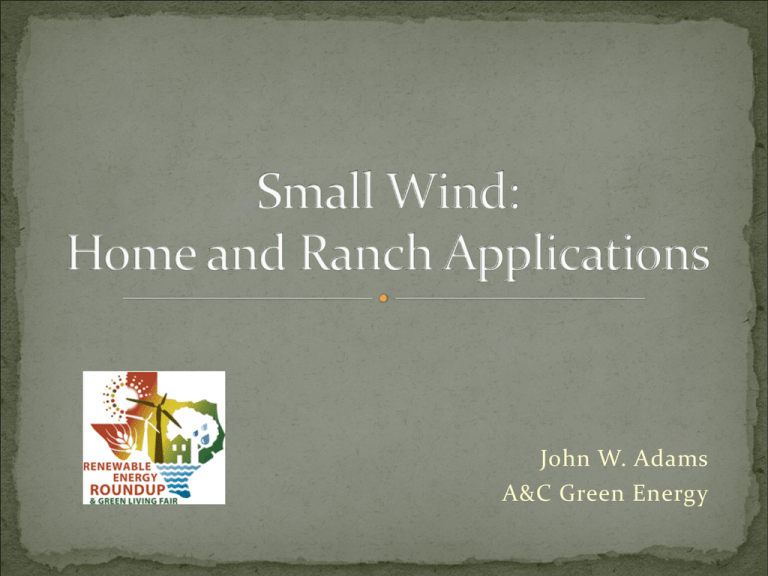
John W. Adams A&C Green Energy Based on known oil reserves and the worldwide consumption rate, most estimates suggest this reserve has only 50 more years of production left in it. 89% of US total energy comes from fossil fuels Fossil fuel combustion represents a global environmental problem U.S. winds could generate more electricity in 15 years than all of Saudi Arabia's oil, without being depleted The choice is: Invest in discovery of new oil reserves (e.g. off-shore, shale oil) Invest in clean coal technology (20% of the worlds supply of coal is in the US) Invest in alternative energies Evaluation PV (Solar) Hydro Wind Capital Costs Large Enormous Moderate Operating Costs Moderate Negligible Small Efficiency 5 -10% 80% 42% Pollution Waste Heat None Visual Levelized Costs 16 cents/kWh 4 cents/kWh 4.5 cents/kWh Environmental Impact Large Enormous Small 1888, San Angelo Aeromotor markets their windmills to pump water to irrigate crops and feed cattle. This new system opens up the South Plains of Texas and makes living in West Texas possible. Oil, cattle, cotton industries shape the new economy of Texas. Texas is still #1 In 2006, Texas overtook California and continues to lead the nation in total installed wind capacity, shaping our state’s future economy and strengthening our importance in the global marketplace. Presently With advanced engineering and aerodynamic designs, today’s wind turbines are more powerful than their predecessors. What are wind energy applications? Power usage •Irrigation pumps •Electric fences •Entire residence •Street lights •Barn dances •Appliances •Etc.. Industrial systems •1+ megawatts •1 mW = 1,000,000 watts •Weigh over 100 tons •Each blade is over 100’ •200’ tower •Also $1,000,000 turbines •Not more efficient, just bigger Small wind systems • Up to 100kW •1 kW = 1,000 watts •Weigh 5oo lbs to 5 tons •Blades are 6’ to 30’ each •Towers up to 100’ •Home, ranch, farm, business •Eligible for grants and rebates Grid-Tie Off-Grid Check list: •Make sure you are allowed to install a wind turbine •Make sure you have sufficient wind speed •Find out what your electrical usage is •Find funding/grant sources for your area Zoning Approval •NIMBY •HOA •City •County •Minimum acreage •Height restrictions •110% rule Finding the wind speed? Resources •Anemometer •Local airport •Local media •Internet •Trees and flags OUTPUT POWER CURVE 10000 Monthly Energy Output (kWh) 14000 12000 Output Power (W) MONTHLY ENERGY OUTPUT 10000 8000 6000 4000 2000 9000 8000 7000 6000 5000 4000 3000 2000 1000 0 0 9 11 13 15 18 20 22 24 27 29 31 34 36 38 40 Instantaneous Wind Speed (mph) 9 11 13 15 18 20 22 24 27 29 31 34 36 38 40 Average Wind Speed (mph) Monthly Electricy Usage •Electric usage is listed in kWh. •This data is on every monthly statement. Convert turbine’s output power (W) into kW (W) x (.001) = kW Convert kW into kWh How many hours in a year? (365.25) x (24) = 8,766 hrs/year How many hours in a month? 8,766 / 12 = 730.5 hrs/month (730.5) x (kW) = kWh/month MONTHLY ENERGY OUTPUT Wind speed? Monthly electrical Monthly Energy Output (kWh) 10000 usage? Typical sizes needed 9000 8000 7000 6000 2kW – ½ of your energy 5000 5kW – almost all energy 4000 10kW – all, plus surplus 3000 2000 20kW – small biz, ranch 1000 30kW – med. biz, ranch 0 9 11 13 15 18 20 22 24 27 29 31 34 36 38 40 Average Wind Speed (mph) <100kW – large ranch, village Years Install 1 2 3 4 5 6 7 8 9 10 11 12 13 14 15 Gross Cost ($17,500) 30% Tax Credit $5,250 $0 $0 $0 $0 $0 $0 $0 $0 $0 $0 $0 $0 $0 $0 $0 Utility Savings $0 $2,214 $2,298 $2,385 $2,475 $2,569 $2,666 $2,767 $2,871 $2,980 $3,092 $3,209 $3,331 $3,456 $3,587 $3,723 ANNUAL CASH FLOW ($12,250) $2,214 $2,298 $2,385 $2,475 $2,569 $2,666 $2,767 $2,871 $2,980 $3,092 $3,209 $3,331 $3,456 $3,587 $3,723 Cumulative Cash ($12,250) ($10,036) ($7,738) ($5,353) ($2,878) ($309) $2,357 $5,124 $7,995 $10,975 $14,067 $17,276 $20,607 $24,063 $27,650 $31,373 Flow Store in batteries Off-grid or grid-interactive systems Transfer excess to utility company Grid-tie or grid-interactive systems Net metering Similar to ‘roll-over’ minutes on wireless phone plans At the discretion of the utility company Texas is one of the last states NOT mandating net metering Only through Austin Energy or Green Mountain Energy kWh buy back Not at the same rate charged TO you Monopoles •Single tapered pole •“Cleaner” look •More expensive •Urban applications •Single concrete base Lattice Towers •Lattice design •Longer on-site construction •Less expensive •Rural applications •Either single concrete base or separate concrete pads (one per leg) •Usually taller •Taller is better •At least 30’ above wind obstacles •Wide open spaces •Maybe a clearing by a shoreline •Hill crest 30% Federal tax credits American Recovery and Re-Investment Act (Stimulus Bill 2009) <100 kW project IRS Form 5695 for individuals IRS Form 3468 for businesses Non-profit businesses can apply for 25% grant money 25% REAP grants Rural Energy for America Program <50,000 population (based on latest census) SECO – State Energy Conservation Office grants www.seco.cpa.state.tx.us DSIRE Database of State Incentives for Renewables & Efficiency www.dsireusa.org 1. 2. 3. 4. 5. 6. 7. 8. Find out if there are any restrictions against installing wind turbines in your area Find out your area’s wind speed Find out your monthly electric usage Find a good site for your wind turbine Find a wind turbine that will produce what you need Find any funding, tax breaks or grants to help with your project Find an installer and set your project in motion Relax and let Mother Nature do the rest
